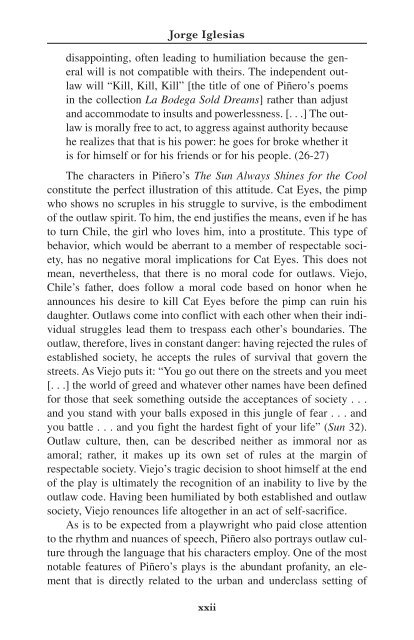Create successful ePaper yourself
Turn your PDF publications into a flip-book with our unique Google optimized e-Paper software.
Jorge Iglesias<br />
disappointing, <strong>of</strong>ten leading to humiliation because <strong>the</strong> general<br />
will is not compatible with <strong>the</strong>irs. The independent <strong>outlaw</strong><br />
will “Kill, Kill, Kill” [<strong>the</strong> title <strong>of</strong> one <strong>of</strong> Piñero’s poems<br />
in <strong>the</strong> collection La Bodega Sold Dreams] ra<strong>the</strong>r than adjust<br />
and accommodate to insults and powerlessness. [. . .] The <strong>outlaw</strong><br />
is morally free to act, to aggress against authority because<br />
he realizes that that is his power: he goes for broke whe<strong>the</strong>r it<br />
is for himself or for his friends or for his people. (26-27)<br />
The characters in Piñero’s The Sun Always Shines for <strong>the</strong> Cool<br />
constitute <strong>the</strong> perfect illustration <strong>of</strong> this attitude. Cat Eyes, <strong>the</strong> pimp<br />
who shows no scruples in his struggle to survive, is <strong>the</strong> embodiment<br />
<strong>of</strong> <strong>the</strong> <strong>outlaw</strong> spirit. To him, <strong>the</strong> end justifies <strong>the</strong> means, even if he has<br />
to turn Chile, <strong>the</strong> girl who loves him, into a prostitute. This type <strong>of</strong><br />
behavior, which would be aberrant to a member <strong>of</strong> respectable society,<br />
has no negative moral implications for Cat Eyes. This does not<br />
mean, never<strong>the</strong>less, that <strong>the</strong>re is no moral code for <strong>outlaw</strong>s. Viejo,<br />
Chile’s fa<strong>the</strong>r, does follow a moral code based on honor when he<br />
announces his desire to kill Cat Eyes before <strong>the</strong> pimp can ruin his<br />
daughter. Outlaws come into conflict with each o<strong>the</strong>r when <strong>the</strong>ir individual<br />
struggles lead <strong>the</strong>m to trespass each o<strong>the</strong>r’s boundaries. The<br />
<strong>outlaw</strong>, <strong>the</strong>refore, lives in constant danger: having rejected <strong>the</strong> rules <strong>of</strong><br />
established society, he accepts <strong>the</strong> rules <strong>of</strong> survival that govern <strong>the</strong><br />
streets. As Viejo puts it: “You go out <strong>the</strong>re on <strong>the</strong> streets and you meet<br />
[. . .] <strong>the</strong> world <strong>of</strong> greed and whatever o<strong>the</strong>r names have been defined<br />
for those that seek something outside <strong>the</strong> acceptances <strong>of</strong> society . . .<br />
and you stand with your balls exposed in this jungle <strong>of</strong> fear . . . and<br />
you battle . . . and you fight <strong>the</strong> hardest fight <strong>of</strong> your life” (Sun 32).<br />
Outlaw culture, <strong>the</strong>n, can be described nei<strong>the</strong>r as immoral nor as<br />
amoral; ra<strong>the</strong>r, it makes up its own set <strong>of</strong> rules at <strong>the</strong> margin <strong>of</strong><br />
respectable society. Viejo’s tragic decision to shoot himself at <strong>the</strong> end<br />
<strong>of</strong> <strong>the</strong> play is ultimately <strong>the</strong> recognition <strong>of</strong> an inability to live by <strong>the</strong><br />
<strong>outlaw</strong> code. Having been humiliated by both established and <strong>outlaw</strong><br />
society, Viejo renounces life altoge<strong>the</strong>r in an act <strong>of</strong> self-sacrifice.<br />
As is to be expected from a playwright who paid close attention<br />
to <strong>the</strong> rhythm and nuances <strong>of</strong> speech, Piñero also portrays <strong>outlaw</strong> culture<br />
through <strong>the</strong> language that his characters employ. One <strong>of</strong> <strong>the</strong> most<br />
notable features <strong>of</strong> Piñero’s plays is <strong>the</strong> abundant pr<strong>of</strong>anity, an element<br />
that is directly related to <strong>the</strong> urban and underclass setting <strong>of</strong><br />
xxii


